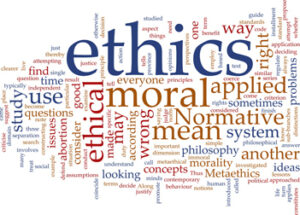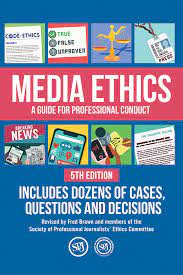 Ethics involves what is right, equitable, fair, just, dutiful and responsible.
Ethics involves what is right, equitable, fair, just, dutiful and responsible.
Although some people will scoff at the idea of media ethics, in fact, ethical practice is as important in media and communication professions as it is in any other walk of life with high levels of public impact. Journalists, advertising executives, filmmakers, public relations practitioners, and others in the media are expected to be ethical. They have professional obligations which they would ignore only at great peril to others as well as themselves.
Many professions have codes of ethics. For example, the American Library Association‘s Code of Ethics, the American Medical Association‘s Code of Medical Ethics and the American Bar Association‘s Model Rules of Professional Conduct. Others, including dentistry, social work, education, government service, engineering, real estate, architecture, banking, insurance, and human resources management, also have codes of ethics.
Media professions — including journalism, advertising, public relations, broadcasting and digital content creation –each have codes of ethics.They are informed first by the general study of ethics, but each have unique professional codes and principles of professional responsibility. Let’s take a quick look at those and then go in depth.
1. Ethics as a general area of study — Here were are mostly concerned with normative ethics, that is, the study of standards for the rightness and wrongness of actions. These areas of ethics involve ethical traditions, religious traditions and moral principles.
2. Professional codes for media include codes of ethics of the Society of Professional Journalists, the American Advertising Federation, the Radio TV News Directors Association, and the Public Relations Society of America.
3. Information & Communications Technology (ICT) ethics are increasingly important in a world where information technologies are vehicles for psychological warfare between cultures, ideologies and nations. International law prohibits members of the media from complicity in crimes against humanity such as encouraging genocide. Beyond that, however, much of an emerging ICT ethical code is only beginning to emerge. Other general principles of media responsibility have been described in the Hutchins and MacBride commissions.
Media ethics is distinguished from the ethics of other professions because:
- The media have a broader responsibility than most professions, as noted by Fred Brown in “Media Ethics” published by the Sigma Delta Chi / SPJ Foundation:
The principle of open communication has a unique standing in American society. In that context, ethical reasoning requires a considerably different approach than is common in professional ethics… In a democratic society, the audience is expected to process a much broader range of information than in other cultures. So, when we speak of journalism ethics, then, we speak not of regulated behavior, the phenomenon most familiar to us as we look at the activities of doctors, lawyers, plumbers and others who follow professional codes. - US media have no direct supervision from certifying boards and associations, unlike medicine and other professions. Again, according to Brown: This absence of professional discipline makes journalistic codes, including the SPJ Code of Ethics, more advisory than mandatory. That is in sharp contrast to the enforceable codes of the legal and medical professions, and a source of concern to those who see a need to “control” anyone who possesses the kind of power the media are perceived to have. But it also means that journalists, individually and collectively, have a greater need for an articulated sense of ethics than do the more regulated professions.
Why study ethics?
The consequences of ethical behavior are profound. Although unethical behavior may sometimes seem to help people rise more quickly in their fields, people with a strong sense of ethics have more stable, stronger, longer-lasting careers. In other words, there are practical reasons to be ethical, whether or not you believe in universal laws of right and wrong.
You need to be prepared for ethical challenges in your job. Professionals who do not follow professional ethics, or who witlessly breach ethical codes, are often fired or demoted. Sometimes editors or managers will ask subordinates to do things that are unethical to test them or to find an office scapegoat. In either case, the practical approach (question the order, discuss the order in the light of ethical codes (see below), get the order in writing, protest to a supervisor, or to begin looking for other jobs) is usually sufficient.
Some would argue that ethics cannot be taught — a person is either ethical or is not ethical. But that view is uninformed. Although a sense of ethics may vary in strength from person to person, a complete lack of ethics or compassion is rare and is usually considered to be a symptom of mental illness.
The personal sense of ethics is very much like the desire for freedom. Nearly everyone has some desire to be free. In a university class we don’t learn freedom per se, but we do try to understand the legal systems that protect personal freedom while balancing the interests of others. Similarly, we don’t learn to acquire a sense of ethics, but rather, we try to understand ethical systems and principles for coping with challenges on a personal and professional basis. We have to read the moral compass and find the obstacles before plotting a course.
REading 
Media Ethics, SPJ book
Media Ethics (Wikipedia)
Digital Media Ethics, University of Wisconsin
Content moderation not possible us AI, Shorenstein Center, Harvard University
News Media and Ethics, University of Minnesota (SOLs)
Also
Free Speech Center News, Middle Tennessee State University (news updates available)
Reporters Committee for Freedom of the Press
